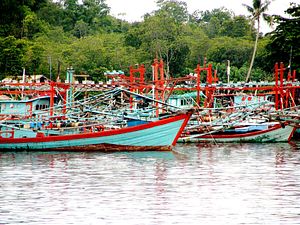The Indonesian Navy (TNI-AL) plans to blow up 70 foreign ships when the country celebrates the 70th year of Indonesian independence August 17, the country’s navy chief said August 7.
Speaking following a base inauguration in Pontianak, TNI Navy Chief of Staff Admiral Ade Supandi said the foreign ships to be sunk were ones caught poaching in Indonesian waters by the nation’s authorities.
The act itself will come as little surprise to most Indonesia watchers. As I’ve written previously, Indonesia under President Joko “Jokowi” Widodo has launched a tough crackdown on illegal fishing in Indonesian waters, which he says causes the country to suffer annual losses of over $20 billion (See: “Explaining Indonesia’s ‘Sink the Vessels’ Policy Under Jokowi”). That has resulted in a series of highly public sinking of boats from neighboring countries over the past year – part of what Jokowi has described as a “shock therapy” approach in spite of concerns among some of Indonesia’s neighbors (See: “Is Indonesia Turning Away From ASEAN Under Jokowi?”). While the practice of sinking vessels itself is not new, it has been conducted in a more high-profile and expansive manner as part of Jokowi’s broader vision of turning the country into a “global maritime fulcrum” between the Indian and Pacific Oceans (See: “The Trouble With Indonesia’s Foreign Policy Priorities Under Jokowi”).
But this appears to be the largest mass public sinking of foreign vessels under Jokowi thus far. The last one of its kind, which occurred on May 20 to commemorate National Awakening Day, involved 41 foreign vessels, including the first vessel from China to be sunk (See “Why Did Indonesia Just Sink a Vessel from China?”). The choice to blow up 70 vessels to celebrate 70 years of Indonesian independence this time is likely to fuel fears that the Jokowi administration is using the issue to stoke Indonesian nationalism amid its waning popularity.
Yet Indonesian officials continue to point out that the problem is a serious one and that the country has little choice but to employ the approach to safeguard its rights. Asep Burhanudin, the director general of marine and fisheries natural resources supervision, said that as of the beginning of August 2015, his office had handled at least 92 cases of poaching. However, as Asep himself admitted, poaching is not an act perpetrated by foreign vessels alone – 41 of those 92 cases actually involved Indonesian-flagged ships. Among the foreign ships, a majority of them came from Vietnam (33 ships) while the rest came from the Philippines (eight), Thailand (five), and Malaysia (five).

































